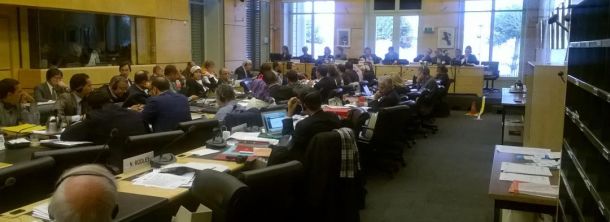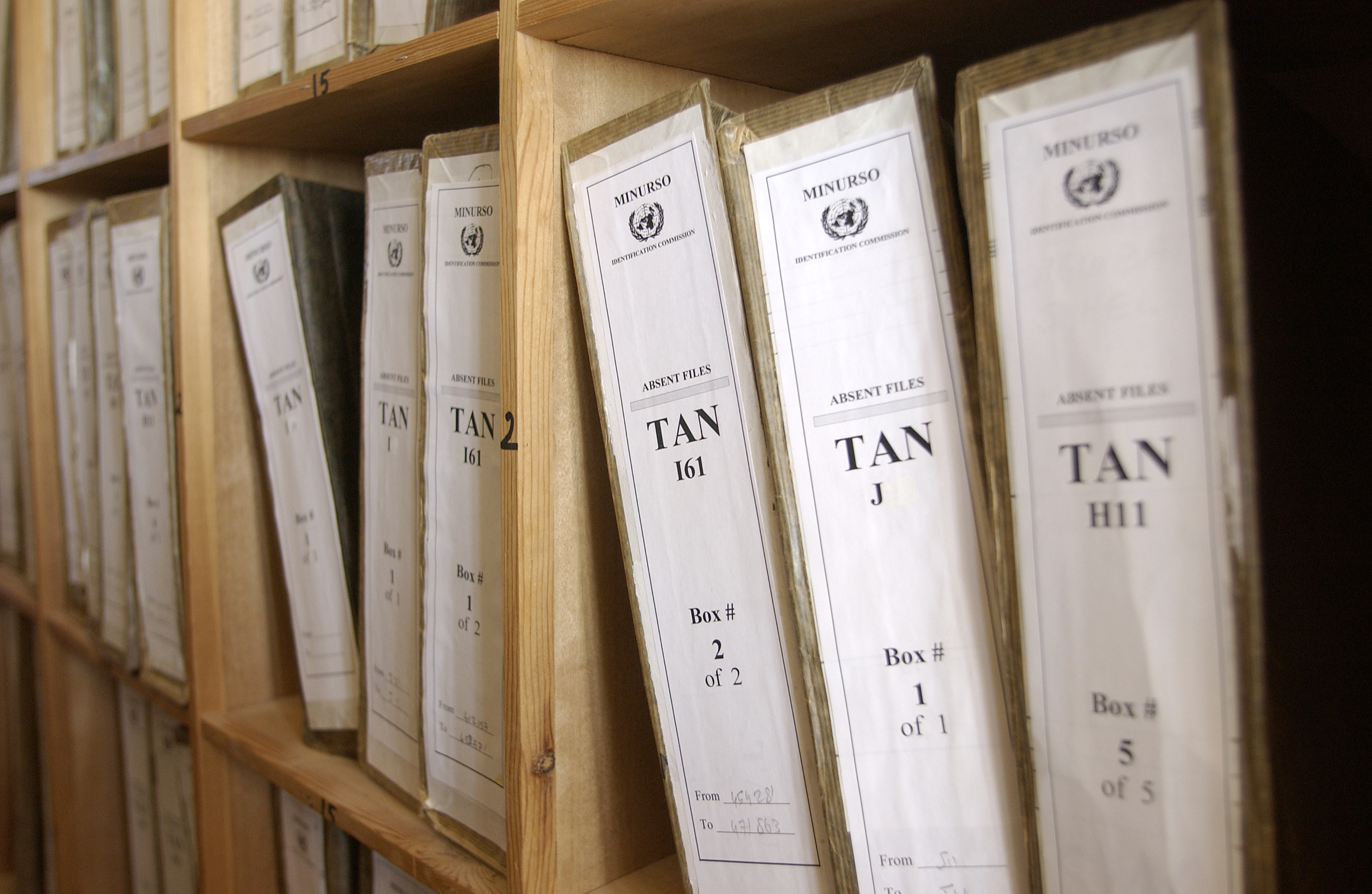UN-Komitee äussert Bedenken zu fehlender Zustimmung der Sahraouis bei

Der UN-Menschenrechtsausschuss zur Überwachung der bürgerlichen und politischen Rechte (ICCPR) äusserte heute grosse Bedenken zum Verhalten Marokkos. Sie betreffen die Verwaltung der natürlichen Ressourcen in der Westsahara, den Stillstand im Selbstbestimmungsprozess der Sahraouis und die Folter von Sahraouis.
Veröffentlicht 04. November 2016
Foto: Marokko wird vom UN-Menschenrechtsausschuss (ICCPR) befragt, 25. Oktober 2016.
Den Bericht "Observations finales concernant le sixième rapport périodique du Maroc", publiziert am 4. November 2016, gibt es zurzeit nur in Französisch.
Der Bericht erscheint nach einem einjährigen Prozess und nachdem Marokko dem Komitee dargelegt hatte, wie das Land mit politischen und zivilen Rechten umgeht. Am 24. - 25. Oktober wurde Marokko vom Komitee befragt, heute wurde das voraussichtliche Ergebnis präsentiert.
Der Bericht und alle dazugehörenden Dokumente können auf der Webseite des Center for Civil and Political Rights des UN-Menschenrechtsrates heruntergeladen werden. Unter den verfügbaren Dokumenten sind zwei Eingaben von WSRW: ein 31seitiges Dokument von 2015 und ein vierseitiges Dokument von 2016.
Das Expertenkomitee ICCPR ist „beunruhigt von a) den begrenzten Fortschritten im Prozess der Selbstbestimmung des sahraouischen Volkes; b) von der Information, dass die staatliche Seite nicht alle nötigen Massnahmen getroffen hat, die Bevölkerung der Westsahara zu befragen bezügliche der Ressourcenausbeutung in der Westsahara; c) dem Sandwall, der die Bewegungsfreiheit der Menschen in der Westsahara einschränkt.“ (Übersetzung WSRW)
Zu ähnlichen Befunden kam letztes Jahr der UN-Ausschuss über wirtschaftliche, soziale und kulturelle Rechte (CESCR). Marokko hat die Feststellungen des CESCR von 2015 in allen Punkten zurückgewiesen und erklärt, die Experten seien parteiisch.
Zusätzlich zum erwähnten wesentlichen Paragraphen über die Selbstbestimmung (ganzer Paragraph weiter unten) äussert das Komitee folgend Bedenken:
Translation into English below by WSRW, [with brackets being comments from WSRW].
Right to self-determination
9. The Committee takes note of the Moroccan initiative for the negotiation of an Autonomy law [statute] for the region of Western Sahara and the additional information submitted by the State party [i.e. Morocco], but it remains concerned by: a) the limited progress achieved on the question relating to the self-determination of the people of Western Sahara; b) the information according to which the State party has not taken all necessary measures to consult the people of Western Sahara on the exploitation of the natural resources of Western Sahara; c) the presence of the sand wall that limits [restricts] the free movement of the people of Western Sahara [as a result of] the reduced access for civilians and the presence of land mines and other explosive munitions along the sand wall which poses danger to the life and safety of the populations which live nearby (Articles 1, 6, and 12 [of the ICCPR]).
10. The State party must: a) pursue and strengthen efforts within the context of negotiations concerning the status of Western Sahara required under the auspices of the UN Secretary-General in a manner that ensures realization of the right to self-determination of the people of Western Sahara; b) reinforce the consultative process with the people of Western Sahara with the goal of obtaining their prior, free and informed consent to the realization of developmental projects and [resource] extraction operations; and c) take the necessary measures to allow the people of Western Sahara to move [travel] freely and in safety from one side of the wall to the other and pursue a program of de-mining along the length of the wall and compensate victims.
Diese Version des Dokuments ist gezeichnet als „fortgeschritten und nicht editiert“.
Nachrichten
UN-Abstimmung zur Westsahara wirft mehr Fragen auf, als sie beantwortet
Hinter den Schlagzeilen und diplomatischen Manövern, die suggerieren, der Sicherheitsrat stehe nun auf der Seite Marokkos, verbirgt sich eine komplexere Realität. Diese fußt weiterhin auf genau dem Recht, das Rabat seit Jahrzehnten zu untergraben versucht: dem Recht auf Selbstbestimmung.
18. November 2025
WSRW ruft auf, Ressourcenausbeutung der Westsahara zu thematisieren
WSRW fordert die UN-Mitgliedstaaten auf, die Ausbeutung der Ressourcen der Westsahara durch Marokko bei der UPR-Überprüfung Marokkos im November zur Sprache zu bringen.
18. Oktober 2022
UN-Vertragsorgan fordert Rechte für Saharauis
Zum ersten Mal hat ein UN-Vertragsorgan während der Überprüfung von Marokkos Verpflichtungen gegenüber dem Internationalen Pakt über wirtschaftliche, soziale und kulturelle Rechte (Sozialpakt) bezogen auf die Westsahara eine Reihe starker Empfehlungen formuliert.
19. Oktober 2015
Der Präsident der Westsahara fordert UN-Intervention zum HALT der EU
Die gestrigen Proteste der Sahrauis gegen die provokativen Pläne der EU, Marokko für Fischereirechte in der besetzten Westsahara zu entgelten, wurden von der marokkanischen Polizei niedergeschlagen. Der Exilpräsident bat heute den UN-Generalsekretär um Intervention vis -à-vis Marokkos bezüglich der wiederholten Angriffe gegen die friedlichen und wehrlosen sahrauischen Bürgerinnen und Bürger und gegen den gesetzeswidrigen EU-Fischerei Deal.
09. Dezember 2013



